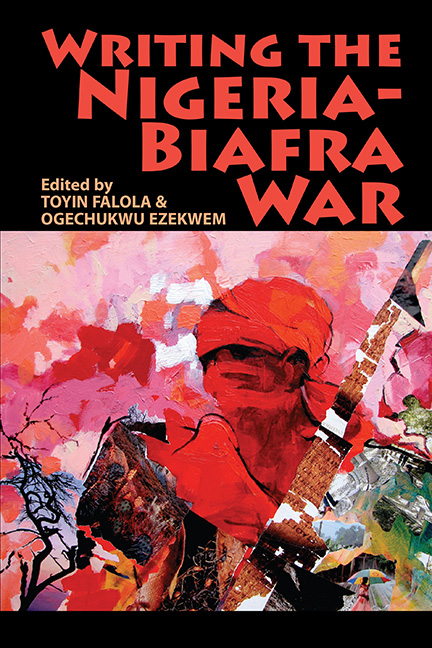Book contents
- Frontmatter
- Contents
- Notes on Contributors
- List of Abbreviations
- Timeline
- Map of Biafra 30 May 1967 – 1 May 1969
- 1 Scholarly Trends, Issues, and Themes: Introduction
- Part I On The History Of The Nigeria-Biafra War
- Part II Critical Debates On The Nigerian Crisis
- Part III The War In Fiction, Memoir, And Imagination
- Part IV Locating Gender In Nigeria-Biafra War Literature
- Select Bibliography
- Index
15 - Magical Realism or Science Fiction: The Nigerian Civil War and Ali Mazrui’s The Trial of Christopher Okigbo
Published online by Cambridge University Press: 17 June 2021
- Frontmatter
- Contents
- Notes on Contributors
- List of Abbreviations
- Timeline
- Map of Biafra 30 May 1967 – 1 May 1969
- 1 Scholarly Trends, Issues, and Themes: Introduction
- Part I On The History Of The Nigeria-Biafra War
- Part II Critical Debates On The Nigerian Crisis
- Part III The War In Fiction, Memoir, And Imagination
- Part IV Locating Gender In Nigeria-Biafra War Literature
- Select Bibliography
- Index
Summary
‘Death itself in many of our societies, you will remember, was one more ceremonial transition. It constituted a passing in some ways no more fundamental, and certainly no less fundamental, than the transition from preadulthood to the full status of the adult. Death was not an interruption but a continuation.’
Ali Mazrui, The Trial of Christopher Okigbo, 37Poet Christopher Okigbo remains an enigma who continues to feature in African literature and the literary creativity and activities of several writers and Africanists, including Chinua Achebe, Wole Soyinka, and Ali Mazrui. Hardly can a discussion of the Nigerian Civil War of 1967–1970 take place without a reference to Okigbo because he moved swiftly from being an accomplished poet to a soldier fighting on the side of Biafra during the war, suggesting that the urgency of the war went beyond poetry. One of the books that considers Okigbo's role in the civil war is Mazrui's The Trial of Christopher Okigbo where Okigbo is tried in After-Africa or afterlife for abandoning poetry for the war front. The book is particularly significant because of its futuristic and magical content and setting and its exclusive imaginative pretense to reality.
This chapter will discuss The Trial of Christopher Okigbo within the context of the Nigeria-Biafra War and explore the highly resourceful frame of the novel, the accusations against Okigbo, the trial, the defense, and the judgment that follows. Mazrui's indebtedness to magical realism and science fiction will be examined, and the suggestion made that the text is possible only because of Mazrui's heavy reliance on those two sub-genres. Some of the other issues the chapter will address are whether there is any jurisdiction to try Okigbo at all either in life or afterlife, whether the trial in the text can resolve the civil war conflict in any meaningful way, whether there is a limit to how literature can dictate the life of a poet or that of a soldier, whether the socio-political considerations of the poet and the soldier are comparable or mutually exclusive such that one cannot be faulted for choosing either path, whether the discursive and counter discursive trends in literature itself are symptomatic of the life of the artist and that of the warrior, and whether any form of African development can be achieved or sustained with the compartmentalization of roles and responsibilities.
- Type
- Chapter
- Information
- Writing the Nigeria-Biafra War , pp. 314 - 327Publisher: Boydell & BrewerPrint publication year: 2016

